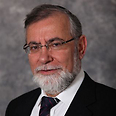
Israeli banks eye haredi customers
Given limited possibilities for growth in local market, Israel's banking institutions study needs of Ultra-Orthodox population
Many, if not all, of Israel's banks have exhausted their possibilities for local growth, analysts say. The future, they explain, lies to a large extent abroad and in expanded financial services.
However, there appears to be potential in sectors where until a few years ago most banks weren't active – especially the Ultra-Orthodox. In recent years, banks have learned that speaking to haredim in their own language can bring in a lot of business.
Related stories:
- Bank of Israel: 45% of haredim worked in 2011
It can't be denied that the population is, for the most part, on the lower rungs of the socioeconomic ladder, with most families living under the poverty line. Their participation in the labor market is considerably lower than that of the general population. But the banks still see advantages in working with haredim.
"Generally, this is a very loyal, responsible population," says Yaakov Tannenbaum, general director of the Mercantile Bank, which operates in the Ultra-Orthodox sector. "The average haredi won't take on obligations he can't meet."
Haredi families' biggest expense is housing, but unlike secular families, haredim piece together mortgages from a much wider variety of sources, including parents on both sides, Tannenbaum explains. Moreover, he adds, haredim have an "amazing" ability to meet mortgage payments: "They have an almost 100% rate of repayment and there are almost no delays."
When asked what banks need to do to adapt to the needs of haredi customers, Tannenbaum said, "You need to understand the language and how to dress, basic things. This is a population that likes to work with someone who understands their needs. The clerk doesn't have to be haredi or religious." He added that bank branches in haredi locations employ non-religious staff, whose relationships with the customers are as good as their observant colleagues'.
However, there are clear differences. Among haredim, Thursday evening is the most active time of the week, and banks have learned to keep relevant branches open late. Banks have also opened self-service centers and made direct teller service available, a major point for a group that for the most part has limited access to online banking services, either through computers or smartphones.
Traditionally, a member of the Ultra-Orthodox public who needs a loan of a few thousand or even tens of thousands of shekels will first head for a 'gemach' (gmilut hassidim) – funds that provide interest-free loans. However, Tannenbaum said that this practice does not present an obstacle for banks.
"The gemach is an integral part of the haredi public's financial experience, but it can't replace the need for a bank," Tannenbaum claimed. "I don't think that the banking system is hurt by (gemachim), even if they create (less need for) loans."
When it comes to investments, the banking industry has noted that haredim are active and have greater than average knowledge of the field. Moreover, banks are looking at the business potential in thousands of haredi institutions – schools, charities, health care, and more – which generate hundreds of millions of shekels each year and require a range of financial services.
So how, in the end, do the banks drum up new business? The methods haven't changed in a century – "nothing beats a 'pashkavil' (notice) on the wall," one expert in the haredi advertising sector says. "It's less profitable for a lot of media organizations, so they don't like it, but it's proven itself (to be) the best way to reach the sector, in the financial field, as well."










